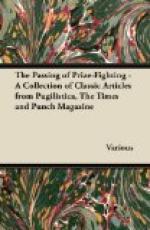* * * * *
OFTEN TALKED ABOUT BUT NEVER SEEN.—“A Clean Sweep.”
* * * * *
[Illustration: ICHABOD!
GOG. “NO PRIME MINISTER! NO FURRIN
SECKETARY! NO CHANCELLOR O’ TH’
EXCHEQUER!”
MAGOG (bitterly). “S’POSE WE SHAN’T HAVE NO LORD MAYOR NEXT!!”]
* * * * *
THE MAN WHO WOULD.
I.—THE MAN WHO WOULD BE LAUREATE.
[Illustration]
His name was LEGION. He had kept his eye on the Laureateship from his early boyhood, when he sent verses to the Poets’ Corner of the Bungay Weekly Mail, which sometimes published them; then he cut them out, and pasted them neatly in a book, which he still possesses. He always wrote on an occasion. “Lines on the Recovery of My Sister EMILY from the Mumps”; “Dirge on the Decease of a Favourite Squirrel,” beginning, “No more!” but there was always plenty more where that came from, and is still. At College he was one of the three men who wrote in College Rhymes, and secured for that periodical a circulation by taking a hundred copies each. LEGION sent dozens of his, marked, to every poet he heard of, generally addressing them “Dear ALURED” (if that was the Minstrel’s Christian name), or, in verse, “Brother, my Brother, my sweet, swift Brother!” This annoyed some poets, who did not answer; others were good-natured, and would reply,—
“DEAR SIR,—I have to acknowledge, with many thanks, your Cebren and Paris, and anticipate much pleasure from its perusal.”
LEGION kept all these letters in a book, and published some of them as advertisements of his Cebren and Paris (an unsuccessful Newdigate), when it appeared in a volume, with an astonishingly decorative cover. It was a classical piece, in blank verse. Cebren, the father of Oenone, is represented asking Paris what his intentions are as regards that lady. It was piece of classical genre, the author said: such interviews must have occurred when a young Trojan prince, with no particular expectations, paid marked attentions to the daughter of a River-god, like Cebren. Here is a specimen piece,—
“Now mark me, Paris,” said
the River-god,
Seated among the damp lush water-weeds,
His tresses crowned with crow’s-foot,—“Mark
my words,
Thou dalliest with my daughter; what thine
aim,
I ask, and crave an answer—great
thy line,
The lineage of renowned Laomedon.
Thy sires have wedded goddesses ere now.
But wealthy though the House of Troy may
be.
Thy father has a monstrous family,
Daughters and sons as countless as the
rills
That Ida sends to be my tributaries.
What he can give thee, what thy prospects
are,
What settlements thou art prepared to
make,
If thou wouldst lead Oenone to the altar,
This would I know; excuse an anxious sire!”




